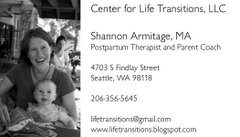Taffy Brodesser-Akner shared her story on Salon.com about how her traumatic birth experience brought on PTSD. Her story serves as a rallying cry for a woman's right to make informed decisions for herself about her care during childbirth. I loved what she had to say about surviving this unfortunate (and sadly, physician-induced) disorder:
"But what my diagnosis has given me is a sense of relief: relief from wondering what was wrong with me, relief from a pricey conveyor belt of specialists who dismissed me as a hormonal, overwhelmed woman. Relief that I don't have to be a person who can handle everything. Relief that other people have gone through this, and survived."
Thank you, Taffy, for speaking out!
Thursday, February 25, 2010
Monday, February 15, 2010
We're Neither All Orchid nor All Dandelions, so says Dobbs
In an attempt to clarify the seemingly binary categories of "orchid" and "dandelion" temperments, David Dobbs in a conversation with David Shenk (also of The Atlantic) says, "(I)t would be a rare person that was all orchid, so to speak, or all dandelion."
I agree. While the orchid-dandelion metaphor is useful in expressing different levels of sensitivity among children and adults, it fails to capture the wide range of in-between where dandelion-ness makes way for orchid-ness, and vice versa.
I recommend reading Dobbs' and Shenk's lively conversation here.
I agree. While the orchid-dandelion metaphor is useful in expressing different levels of sensitivity among children and adults, it fails to capture the wide range of in-between where dandelion-ness makes way for orchid-ness, and vice versa.
I recommend reading Dobbs' and Shenk's lively conversation here.
Labels:
dandelions,
labeling,
orchids,
temperment
Friday, February 12, 2010
The Reproductive Gap
A while back I wrote about a column Lisa Belkin wrote for the New York Times about how caregivers of young children need to articulate to prospective employers on their resumes the skills they've attained while being stay-at-home parents and how they can bring those to bear successfully in the paid work world. Now, here comes an interesting article in The Chronicle of Higher Education where the author, Amy Kittlestrom, makes a persuasive argument for placing a "reproductive allowance" on one's vita, explaining what one might have achieved (a book, a research project, etc.) during time spent giving birth to and raising young children.
I'm curious how others who've returned to paid work have dealt with this "baby gap" issue on their resumes. Bring your comments!
I'm curious how others who've returned to paid work have dealt with this "baby gap" issue on their resumes. Bring your comments!
Labels:
childbirth,
families,
School,
transitions,
work
Wednesday, February 3, 2010
New Interactive Blog Explores the Connection Between Eating Problems and Relationships
I've just come across a new interactive blog from Beverly Price that provides a forum for discussing how eating problems and personal relationships are interconnected. Please share with the people you know who struggle with eating problems.
Labels:
eating problems,
food,
relationships,
yoga
Subscribe to:
Comments (Atom)
